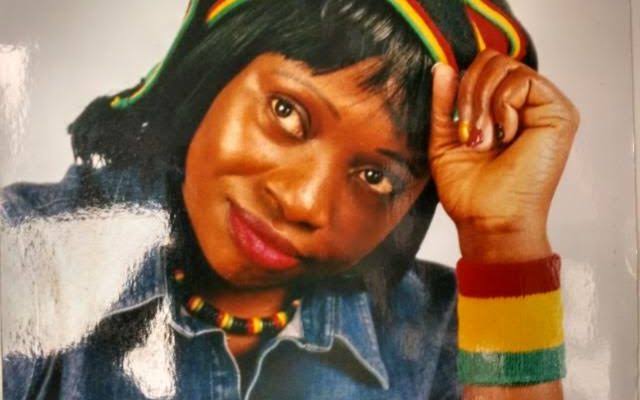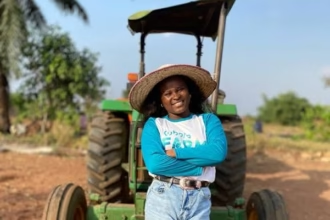Evi Edna Ogholi, born on July 6, 1965, in Isoko, Delta State, Nigeria, is widely celebrated as the “Queen of Nigerian Reggae.” She began her musical journey in a church choir, a path influenced by her father, a reverend. After completing secondary school, she moved to Lagos in 1985 to pursue a professional music career, armed with just a demo tape and an indomitable spirit.
In Lagos, she connected with Emma Ogosi, an artist manager and producer, who became instrumental in her career. With his guidance, Evi signed with Polygram (now Premier Records) and released her debut album, My Kind of Music, in 1987. The album achieved commercial success, setting the stage for her rise to stardom.
Musical Achievements
Evi Edna Ogholi’s discography is a testament to her impact on Nigerian music, particularly reggae. Some of her notable works include:
- Happy Birthday (1988): This album became a household favorite with tracks like “Happy Birthday” and “Ririovara (Dry Your Tears).” It solidified her status as a musical icon and has been played at countless celebrations across Nigeria.
- On the Move (1988): Featuring hits like “Obaro,” this album also went platinum, reflecting her widespread appeal.
Other successful albums include No Place Like Home (1989), Burstin’ Loose (1990), and Step by Step (1990), further showcasing her talent and versatility.
Evi Edna’s music, often sung in her native Isoko language, resonated deeply with audiences across Nigeria and West Africa. By the age of 25, she was a national sensation and had earned the title of Nigeria’s “Queen of Reggae.”
Contribution to Reggae in Nigeria
Evi Edna Ogholi emerged during the golden era of Nigerian reggae in the late 1980s and early 1990s. During this period, reggae gained prominence, inspired by the global success of Bob Marley. Amidst a male-dominated genre, Evi stood out for her unique style and ability to blend reggae with local dialects. Her works were instrumental in popularizing reggae in Nigeria, alongside contemporaries like Majek Fashek and Ras Kimono.
Life Abroad and Recent Works
In the 1990s, Evi Edna relocated to France, where she continues to live. She made a notable return to music in 2017 with the album Peace and Love, followed by Peace in the World in 2018. Despite her years abroad, her music remains influential, and she continues to receive royalties from her classic albums.
Legacy
Evi Edna Ogholi’s contribution to Nigerian and African music is undeniable. Her pioneering role as a female reggae artist in Nigeria not only broke barriers but also inspired many young musicians. Her ability to infuse cultural elements into reggae has left a lasting legacy, cementing her status as one of Nigeria’s greatest music icons.
Discography
Evi Edna Ogholi’s music catalog showcases her versatility and impact on Nigerian reggae. Below is a list of her notable albums and hit songs:
1. Albums:
- My Kind of Music (1987): Her debut album that introduced her to the Nigerian music scene.
- On the Move (1988): Featuring the hit single “Obaro,” this album was a commercial success.
- Happy Birthday (1988): A classic that includes evergreen songs like “Happy Birthday” and “Ririovara.”
- No Place Like Home (1989): Further solidified her place as a reggae queen.
- Burstin’ Loose (1990): Demonstrated her growing artistry.
- Step by Step (1990): Another platinum-selling album with significant hits.
- Jah Pikin (1993): A testament to her enduring commitment to reggae music.
- Peace and Love (2017) and Peace in the World (2018): Her comeback albums, emphasizing themes of unity and harmony.
2. Hit Songs:
- “Happy Birthday”
- “Ririovara (Dry Your Tears)”
- “Obaro”
- “Oghene Me”
- “Message to the Youth”
- “Look Before You Cross”
Evi’s music often reflects themes of social justice, cultural pride, and emotional resilience, which resonated deeply with her fans.
Personal Life
Evi Edna Ogholi’s early life in Isoko, Delta State, was rooted in a strong Christian background, which influenced her decision to join a church choir. Her father, a reverend, played a pivotal role in shaping her moral and artistic foundation. Moving to Lagos at just 20 years old, she demonstrated remarkable determination to chase her dreams.
Her partnership with producer Emma Ogosi, who later became her husband, was central to her initial success. Together, they created some of her most memorable tracks, blending reggae rhythms with Nigerian cultural elements.
Influence
Evi’s ability to sing in her native Isoko language set her apart, making her music accessible and relatable to diverse audiences. Her work during the golden era of reggae in Nigeria established her as a Legend. Even in a male-dominated genre, she held her own, paving the way for other female artists in the country.
Evi Edna Ogholi continues to inspire musicians, and her timeless tracks are celebrated at events and gatherings across Nigeria and beyond. She remains a symbol of perseverance, creativity, and cultural pride.










